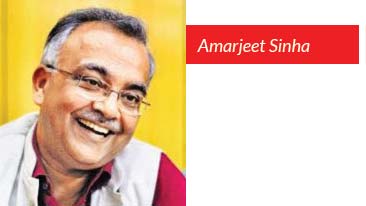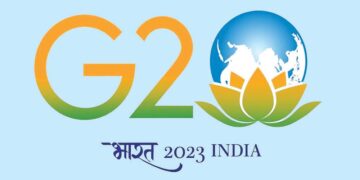 G20 leadership has caught the imagination of many in India. For the average Indian it reflects India’s aspirations. It is also a leadership of an elite club of nations that account for 80 per cent of the world’s GDP.
G20 leadership has caught the imagination of many in India. For the average Indian it reflects India’s aspirations. It is also a leadership of an elite club of nations that account for 80 per cent of the world’s GDP.
The tag of the fastest growing economy, the race towards becoming the third largest economy, a better than totalitarian China’s management of Covid and its consequences so far, 415 million people brought out of multidimensional poverty between 2005- 06 and 2019-21, entry into the Amritkaal of Independence, and an aspiration to be a developed India by 2047 when we celebrate hundred years of freedom, makes the leadership a unique moment in India’s history.
India has had some exemplar successes worth emulating in other G20 countries and the rest of the world. Thomas Piketty’s ‘universalist sovereignism’ springs from an opportunity that comes after global dislocations, in a world moving towards greater equality.
Covid dislocations, the Ukraine war, recession in the developed world, and the need for a more inclusive new world order is one such moment. “Like the quest for ideal democracy, which is nothing other than the march toward political equality, the march towards equality in all forms (social, economic, educational, cultural, political) is an on-going process that will never get completed.” (Thomas Piketty 2022).
Multiple offerings
The use of digital technology; the start-up eco system; the payment infrastructure; the Cowin platform; the vaccine, its logistics, and the human resources for vaccination up to the last mile; the large pharmaceutical industry and its contribution to the world in a time of need; the soft power of yoga, meditation, millets and Ayurveda; the young professionals in the IT, education and health sectors, are all sectors where India can provide quality services and goods to the world at large.
In its quest for freedom from poverty and ascendance of human well-being in the new world order built on Vasudhaiva Kutumbakam (the world is one family), there are many lessons that our fellow G20 nations offer for India. We need to heed to them as well on priority for a new world order. To be completely evidence-based and without any bias, a detailed comparison of the G20 nations was undertaken on parameters of growth and well-being to arrive at five key priority actions that India needs to take to become an Inclusive India for All. These are:
Females in workforce
First, improving Female Labour Force Participation Rate (FLFPR). Except Saudi Arabia, India is behind all other G20 nations on FLFPR. Nations with high per capita gross national income adjusted for purchasing power parity in dollar terms for 2017, have high FLFPR.
Turkiye also needs to do much more on this indicator. Clearly, a larger workforce participation contributes significantly to higher wealth generation. Given its population that is stabilizing at a decent pace in recent years, it is not enough for India to become the third largest economy. It needs to raise productivity and participation rates.
The large-scale expansion of the women’s collectives under the Livelihood Mission is an occasion of hope for India; we need to further focus on credit access for largerscale enterprises of women. Women led development is indeed the way forward. Education is the instrument of this transformation.
Multi-dimensional poverty
Second, of the developing nations in G20, in spite of 415 million persons coming out of Multi-Dimensional Poverty (MDP) over the last 15 years in India, we continue to have the highest (16.4%) population still in MDP. Add to this another 18.7 per cent population that is vulnerable to MDP and slips into poverty temporarily, in moments and after events like Covid disruption, we still have a long way to go.
While on removing asset base of the poor in terms of housing, sanitation, electricity, gas, bank account, social capital, roads, immunization, we have done well over the last decade, we need to further improve our rate of progress in education, health, skills, livelihoods and nutrition to be able to match the other G20 nations.
Nutrition among women and infants has been embarrassing us and the G20 leadership should be a moment to make a difference with effective decentralized action through accountable local governments, with funds, functions and functionaries. Though China had 3.9% in MDP, it had another 18.7% in population vulnerable to MDP. In the Covid crisis in China, many of these vulnerable households are sinking back to poverty. While we have done better than earlier 2005-06 onwards on poverty and 1991 onwards on growth, there is still a long way to go to compete in the G20 Club.
Human development index
Third, The United Nations Development Programme (UNDP) 2022 Human Development Report calculates Human Development Index (HDI) values on the basis of life expectancy, per capita GNI in dollar terms adjusted for PPP in dollars, and expected and mean years of schooling.
China at 82nd, Brazil at 86th, Indonesia at 116th, Saudi Arabia at 102nd, and India at 132nd are the G20 nations that have long strides to take before they equal other members who are all below Rank 50. Better HDI value and rank and high per capita GNI, life expectancy (except South Africa due to HIV/ AIDS) and high expected and mean years of schooling go together.
India’s Amritkaal journey therefore, must focus on India joining the top 50 nations of the world on human development. This requires resources and a mission mode decentralized action in health, education, nutrition, skills and livelihoods through local governments for effective outcomes.
Per capita income
Fourth, per capita GNI needs high growth especially in high population nations. At 6590 dollars per capita GNI, India has a long way to go. All other G20 nations have per capita GNI well over 10000 dollars. There is no substitute to high rates of growth and India will need to further improve the ease of doing business, financial regulation for ease of investment, better logistics through Gatishakti coordination and convergence, infrastructure development, high employment services sector opportunities and concerted thrust on manufacturing. High HDI and high per capita GNI go together clearly establishing the critical role of human capital in wealth creation and distribution.
Inclusive growth needed
Fifth, an inclusive society and economy needs more shared growth where everyone gains. For this, the percentage who are in MDP or are MDP-vulnerable must come down.
Together, India continues to have the largest percentage that fall in either of the categories. China and South Africa follow in that list. This has implications for equality. We no longer have to have concentration of wealth with a few for growth. A more shared, building businesses from below approach, is possible. India needs to do much more of it.
G20 nations offer lessons to each other. Evidence-based adoption of the five priorities outlined above will go a long way in building a stronger India, a developed India by 2047, that is every Indian’s dream today. Likewise, large-scale use of what India has to offer to the world at large, will also improve the quality of lives of the people everywhere. It will truly be a one earth, family, one future moment. This alone will lay the foundation of a truly inclusive global world order where interventions are in line with intentions.
(The writer is a former Advisor to the Prime Minister. The views are personal)














 G20 podium
G20 podium

